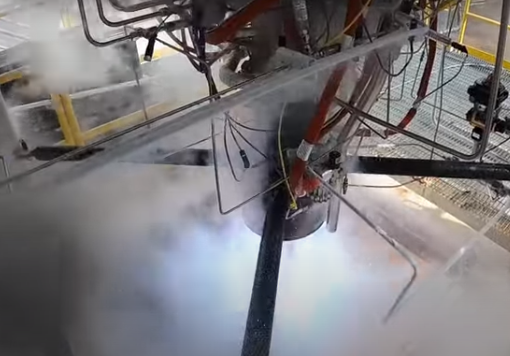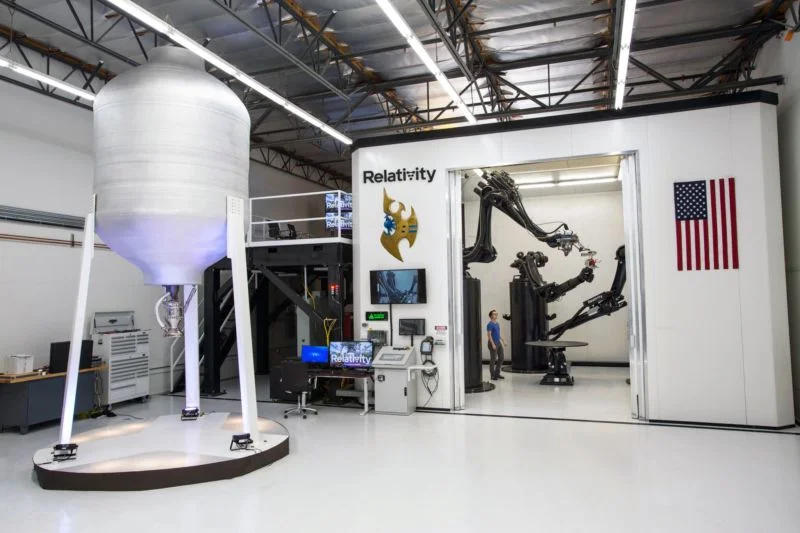Relativity Space said Monday that the company has successfully completed a full-duration test-firing of its Aeon 1 rocket engine, running it at full power for 187 seconds.
Read MoreRocket builder Relativity Space this summer moved into its new headquarters in Long Beach, California.
Read MoreRelativity Space says it has reached an agreement with Iridium to launch six of the company's next-generation communications satellites.
Read MoreDavid Giger bounded up 26 steel steps and emerged onto a rocket engine test platform. Off to his left, an unbroken stand of stately pine trees spread out over the Mississippi lowlands. Straight ahead, Giger had a clear view of two Apollo-era test stands through the trees. “It’s quite a view,” he said.
Read MoreAssembly of the launch vehicle, called Terran 1, its Aeon engines and R&D will all take place in the new HQ. It’s nearly 120,000 square feet, and will be built as a very high-tech manufacturing operation indeed. There will be no fixed tooling, meaning the factory can be rapidly reconfigured, and will be highly automated. The company’s 3D printers aren’t like the simple ones used for rough prototyping, but enormous, carefully monitored robot arms that perform real-time analysis of the metal they are laying down.
Read MoreThe aerospace startup is moving its headquarters from a 20,000-square-foot facility in Inglewood to a 120,000-square-foot site about 20 miles southeast.
Read MoreRelativity Space, a startup using 3-D printing to manufacture small launch vehicles, will move its headquarters to Long Beach, joining several other launch vehicle companies in that Southern California city.
Relativity announced Feb. 28 that it is moving into a 120,000-square-foot facility in Long Beach that will serve as its new headquarters and launch vehicle manufacturing facility. Company officials had said for months that they were looking for a larger facility as they outgrew existing space in Los Angeles.
Read MoreWith their manufacturing square footage increasing fivefold to 3D-print rocket components for orbital missions, Relativity Space is taking a run at the space business.
The young company, fresh off a $140 million Series C round in late 2019, announced they have secured a massive 120,000 sq. ft manufacturing facility and operations center in Long Beach, California to make rocket parts quickly, cheaply and reliably.
Read MoreAhead of its first rocket launch next year, Relativity Space is moving into new, bigger digs in Long Beach, California where it will build the first fully 3D printed rockets to launch from Cape Canaveral.
Bursting at the seams at its current industrial headquarters not far from the Los Angeles International Airport the new sprawling 120,000-square-foot space in Long Beach will allow the five-year-old company to really spread out and begin assembling its Terran 1 rockets.
Read MoreRelativity Space, the first company to utilize additive manufacturing and robotics to build an entire launch vehicle, today announced that it has secured a new headquarters in Long Beach, California. Located at 3500 E Burnett, Long Beach, the 120,000 sq. ft. space will house both the company’s business operations and an unprecedented manufacturing facility. Relativity integrates machine learning, software, and robotics with metal additive manufacturing technology and will produce Terran 1, the world’s first 3D printed rocket, at the Long Beach facility.
Read MoreRelativity Space, the first company to utilize additive manufacturing and robotics to build an entire launch vehicle, today announced that it has secured a new headquarters in Long Beach, California. Located at 3500 E Burnett, Long Beach, the 120,000 sq. ft. space will house both the company’s business operations and an unprecedented manufacturing facility. Relativity integrates machine learning, software, and robotics with metal additive manufacturing technology and will produce Terran 1, the world’s first 3D printed rocket, at the Long Beach facility.
Read MorePrivate company Relativity Space is designing and manufacturing 3D printed rockets to launch from Cape Canaveral but one day hopes to see the technology building parts on places like the moon or Mars. We'll talk with Relativity Space's Jordan Noone about the prospects of 3D printing on other worlds — and what his company is doing here on Earth to support that goal. Then, different telescopes see in different wavelengths. What's the difference between ultraviolet, infrared and microwave — and how do different wavelengths help us uncover the mysteries of the universe? We'll ask our panel of expert scientists on this week's installment of "I'd Like to Know".
Read MoreRelativity Space, which plans to launch satellites using entirely 3D-printed rockets, has closed a $140 million Series C funding round. The Los Angeles-based startup says it is now fully funded to begin commercial service in 2021. The Series C round was led by investment companies Bond, which has household names such as Airbnb and Facebook in its portfolio, and Tribal Capital. The round includes new investors Lee Fixel, Michael Ovitz and Spencer Roscoff, as well as actor Jared ...
Read MoreAutonomous rocket developer Relativity Space Inc. raised a $140 million Series C round co-led by new investors Tribe Capital Partners and Bond Capital, the company announced Oct. 1.
Read MoreSpace start-up Relativity Space just raised the money it needs to transform the rocket supply chain in the U.S. with 3D printing.
The four-year-old company in Los Angeles, Calif., said it has the funds it needs to reach orbit. Relativity announced on Tuesday it closed $140 million in new fundraising, led by Bond Capital – a fund whose partners include Mary Meeker – and recently-formed Tribe Capital. Meeker helped spin Bond out of Kleiner Perkins last year and the $1.3 billion fund’s investment in Relativity is its first in the space industry.
Read MoreNew York (CNN Business)Relativity Space, a rocket startup founded by former Blue Origin and SpaceX engineers, just quadrupled its funding by raising $140 million.
CEO Tim Ellis says it's enough cash to fund Relativity through the first launch of its Terran 1 rocket in 2021.
Read MoreRelativity Space, which is building 3D-printed rockets, is on track to launch its first commercial payload in 2021 thanks to a $140 million series C funding round. The capital raise will enable the company to fully develop and test its rocket, dubbed Terran 1, and begin commercial operations.
Read MoreAerospace startup Relativity Space — the company that aims to launch the first fully 3D-printed rocket to orbit — says it has raised all of the money it needs to launch its first mission and then enter commercial operations as early as 2021. After raising $140 million in its latest funding round, Relativity says its total funding now equals $185 million, which is enough money to carry the company through its first flights over the next couple of years.
Read MoreWASHINGTON — Small launch vehicle company Relativity Space announced Oct. 1 it has raised a new round of $140 million, a sign of investor confidence despite strong competition and setbacks suffered by other vehicle developers.
The company said the Series C round was led by two new investors, Bond and Tribe Capital, along with existing inevstors Playground Global, Y Combinator, Social Capital and Mark Cuban. A number of individual investors also participated, including former Disney president Michael Ovitz and entertainer Jared Leto.
Read More


















